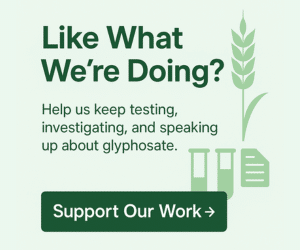Why Is Glyphosate Still on the Market?
The debate over glyphosate’s link to cancer has been ongoing for years, and despite thousands of lawsuits, scientific controversy, and public outcry, the herbicide remains widely used. Glyphosate, the active ingredient in Roundup, is marketed as safe when used as directed. But if that’s the case, why have so many people brought legal cases claiming that glyphosate exposure caused their cancer?
At the heart of this debate is a critical question: Are regulatory agencies too quick to dismiss health concerns in favor of corporate interests?
The IARC vs. EPA Divide
One of the most significant points of contention is the difference in how international health organizations and U.S. regulatory bodies view glyphosate. In 2015, the International Agency for Research on Cancer (IARC), part of the World Health Organization (WHO), classified glyphosate as “probably carcinogenic to humans.” This classification was based on evidence from human exposure studies, animal studies, and mechanistic data.
In contrast, the U.S. Environmental Protection Agency (EPA) maintains that glyphosate is not likely to be carcinogenic when used according to label instructions. This stark difference raises questions about why scientific consensus appears so divided.
What Does the Research Say?
Studies examining the link between glyphosate and cancer have yielded mixed results. Some research suggests that long-term exposure to glyphosate may increase the risk of non-Hodgkin lymphoma (NHL), while other studies find no significant association.
Key studies that have fueled the debate include:
- Agricultural Health Study (AHS): A large-scale study of farm workers that found no statistically significant increase in NHL among glyphosate users.
- Meta-Analysis (2019): Pooled data from multiple studies found a 41% increased risk of NHL among high-exposure glyphosate users.
- Animal Studies: Some studies have shown that glyphosate exposure can lead to tumor formation in rodents, while others report no such effects.
Given the conflicting data, should we err on the side of caution or continue to rely on the “safe when used correctly” stance?
Footnote: It’s worth considering whether the funding source of studies might influence their conclusions. Numerous reports have highlighted potential conflicts of interest in research, particularly when studies are funded by stakeholders who benefit from the continued use of glyphosate. As consumers and critical thinkers, it’s essential to ask: Who funded the study, and how might that influence the findings?
The Legal Battles: Proof vs. Probability
Bayer, the company that acquired Monsanto, has faced thousands of lawsuits alleging that exposure to Roundup caused cancer. In some high-profile cases, juries have awarded plaintiffs billions in damages. Yet, Bayer continues to maintain that glyphosate is safe, citing regulatory support.
The legal battles hinge on whether the plaintiffs can prove causation — that glyphosate directly caused their cancer. Courts have heard from experts on both sides, but the inconsistency in verdicts reflects the ongoing scientific uncertainty.
Public Perception and Corporate Responsibility
For many consumers, the sheer volume of lawsuits and the size of settlements suggest that something is amiss. Even as regulators back glyphosate’s safety, public confidence continues to erode. Why are we willing to accept the risk when safer alternatives exist?
Final Thoughts
The controversy surrounding glyphosate and cancer is far from settled. While regulatory bodies continue to affirm its safety, mounting legal cases and conflicting scientific studies keep the debate alive. Should we take comfort in regulatory assurances or question the influence of corporate interests on public health policies?
When it comes to cancer risks, is it better to be cautious now rather than regretful later? The debate isn’t just about science — it’s about responsibility, accountability, and public safety.
If you’re concerned about glyphosate exposure and its potential health impacts, subscribe to our mailing list and stay informed.
Resources and References
To better understand the debate surrounding glyphosate and cancer, consider exploring the following credible sources and studies that have shaped public and scientific opinion on the issue.
The Guardian – Does glyphosate cause cancer? Australia’s Roundup case against Monsanto will offer a fresh legal answer
Coverage of the ongoing legal debates and implications of glyphosate-related cancer claims.
Link to: The Guardian Article
International Agency for Research on Cancer (IARC) – Glyphosate Monograph Classification of glyphosate as “probably carcinogenic to humans” (2015).
Link to: IARC Monograph
U.S. Environmental Protection Agency (EPA) – Glyphosate Review
EPA’s stance on glyphosate safety and the assessment of carcinogenic potential.
Link to: EPA Review
Meta-Analysis on Glyphosate and Non-Hodgkin Lymphoma
Study suggesting a 41% increased risk of NHL among high-exposure glyphosate users.
Link to: This study
Agricultural Health Study (AHS)
Long-term study of farm workers examining cancer incidence and glyphosate exposure.
Link to: AHS Study
Staying informed about ongoing research and legal outcomes is essential to understanding the broader implications of glyphosate use on public health.
Image Source & Attribution
The feature image on this page incorporates a photo by balinska, which was then combined into a custom graphic using Canva. Explore their full portfolio here: https://www.123rf.com/profile_balinska.




